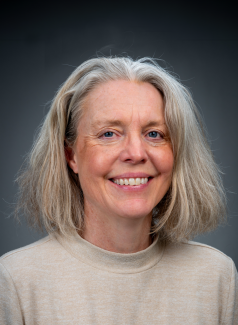As NETL’s new associate director for Computational Sciences & Engineering (CSE), Tammie Borders knows the clock is ticking in the battle against climate change and understands the urgent need to expand the Lab’s capabilities in high-performance computing (HPC) to find solutions.
Tremendous strides have been made by world-class researchers in the Science-based Artificial Intelligence and Machine Learning Institute (SAMI), led by Kelly Rose, acting senior fellow for CSE, and teams in Borders’ directorate to use HPC to develop simulation models, mathematical methods and algorithms, and software tools.
“But here’s the reality — we have to do it faster and better than ever before,” said Borders, a distinguished computer scientist at Sandia National Laboratories prior to joining NETL in January.
The need to rapidly advance HPC is key to meeting the decarbonization goals set by the Biden-Harris administration, which call for a greenhouse gas (GHG)-neutral economy by 2050, a carbon-free power sector by 2035 and a 50% reduction from 2005 levels in economy-wide net GHG pollution by 2030.
Advances in HPC are also needed to meet the goals of the Paris Agreement, an international treaty to keep global temperature increases well below 2°C — and if possible 1.5°C — compared with pre-industrial levels.
“However, to reach these critical objectives, we need to develop HPC capabilities that run calculations at lightning speeds — much faster than those that exist today,” Borders said. “The challenge before us now is to find other ways to make computers more capable,” Borders said.
That work is underway. Upgrades at NETL include the installation of the Joule 3.0 supercomputer, which is expected to be completed in May. This HPC modernization initiative will expand supercomputing capabilities to a peak performance of 8 petaflops. A petaflop is the ability of a computer to do one quadrillion floating-point operations per second.
An expert in developing and operationalizing artificial intelligence (AI), modeling and simulation, and quantum information sciences, Borders points to materials development as one field that will benefit tremendously from advances in HPC or emerging computing architectures such as quantum computing.
Expanded use of intermittent, renewable resources, such as solar and wind power, subjects power plant components to cyclic operating conditions, which also increase performance demands on alloys used in plant construction.
Traditionally, designing affordable alloys that can withstand extreme conditions has been an expensive, time-consuming process because advanced alloys need to be constructed with multiple elements in precise quantities. The need to use multiple elements, coupled with the many ways to construct them, creates nearly endless permutations for an alloy’s design.
“Using high-performance computing, NETL researchers can model materials at the atomic, molecular and microstructural scales and simulate experiments that could take decades, if ever, and cost millions of dollars to complete in the laboratory,” Borders said.
She also noted that NETL is collaborating with Cerebras Systems Inc., one of the world’s top AI hardware manufacturers, to develop cutting-edge computer modeling capabilities using wafer-scale engine computer architecture.
Through this collaboration, NETL developed the Wafer-scale engine Field equation Application programming interface (WFA) to complete complex simulations several hundred times faster, allowing Lab researchers to design carbon capture equipment and novel energy generation and transfer equipment in less time and accelerate the transition to a net-zero economy.
In addition, NETL has prioritized the development of quantum computing, a rising, powerful and promising new force for complex and fast problem-solving. NETL experts are preparing to use quantum computing to sift through large numbers of possibilities to extract solutions to complex problems at speeds exponentially higher than conventional computers and with less energy consumption.
Borders, who grew up in east Texas and earned her doctorate in computational physical chemistry from the University of North Texas, recognizes that advancing HPC to meet climate change deadlines will require a dedicated effort by researchers and staff across her directorate.
As part of her leadership style, Borders emphasizes the importance of finding non-work activities to maintain a positive work-life balance. “Exercise and cooking work for me. They help me to think clearly and decompress. And I’m always pleased when people tell me they like my mango salsa,” Borders said.
She also understands from first-hand experience that taking good care of yourself and those in your family circle, including pets, builds positivity.
When her dog, Sasha, developed vision and hearing issues, Borders found a service dog to provide Sasha with companionship and assistance. The canine helper became known affectionately as Dobby, the devoted and caring house-elf from the Harry Potter series.
“The connection that grew between these two dogs inspired our family and friends with a positive energy that spilled over into other parts of our lives,” Borders said.
NETL is a U.S. Department of Energy national laboratory that drives innovation and delivers technological solutions for an environmentally sustainable and prosperous energy future. By using its world-class talent and research facilities, NETL is ensuring affordable, abundant and reliable energy that drives a robust economy and national security, while developing technologies to manage carbon across the full life cycle, enabling environmental sustainability for all Americans




